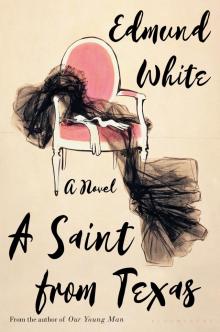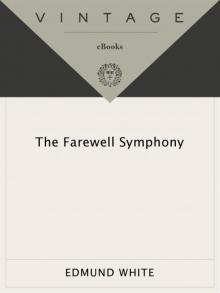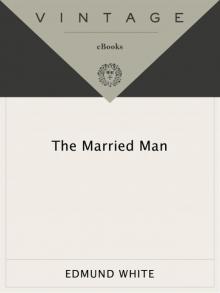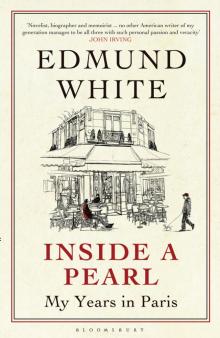- Home
- Edmund White
Inside a Pearl Page 15
Inside a Pearl Read online
Page 15
Once I had what might be called a Proustian moment at the Voltaire. When I was a kid I’d seen an opera at Chicago’s Lyric Opera, Lord Byron’s Love Letter, by Raffaello de Banfield. It was based on a libretto by Tennessee Williams, who was inspired by Henry James’s The Aspern Papers, except that Williams had set the opera not in Venice but in New Orleans. At age fifteen I was very moved by the music, which I now realize was sort of sub-Puccini. That evening at the Voltaire, James saluted a man his age eating alone, then when we were alone together at our table said, not too softly, which was never his style, “There’s that old fraud, Raffaello Banfield.”
“What! He’s one of my favorite composers.”
“Don’t stare or he’ll come over and we’ll never get rid of him. Quel raseur!” (“What a bore!”)
“But I love Lord Byron. I even had an LP of it.”
“Sweetie, I’m sure he hired someone to write it for him.”
And yet how happy I would have been to meet one of my teenage idols.
James liked to make a spectacle of himself in restaurants, though seldom at the Voltaire.
Or maybe he couldn’t control himself. In the beautiful hillside town of Les Baux-de-Provence, we had dinner many times at the Oustau de Baumanière, and it could have been such a special treat. The pleasantly shaded outdoor restaurant overlooked a gorgeous, irrigated valley sunk between dramatically steep walls of craggy reddish stone—and just beyond, the lowlands that swept down to the Camargue, with its wild white horses and pink flamingos.
Drunk, James became something of a control freak, as bullying with the servants as he was generous with the pours of expensive champagne for his guests. The sun was going down over the colorful lowlands and all James could worry about was keeping the champagne bucket next to his chair, where he could reach it just at the moment he was ready to pour from it himself. After all, he was the host—and in his lapel he wore the red button of the Legion of Honor.
The wine steward, no doubt afraid for his job, refused to relinquish the duty, and there ensued an argument we believed might come to actual blows. The bucket stayed in the steward’s territory off away from the table, the steward guarding it haughtily, until James could no longer take it and began shouting in English, “I said I want it here—and I mean now!”
With difficulty, the young man finally did what he was told. Maybe since dinner for six was costing thousands of euros, he was obliged to obey.
For a while James owned a summer house outside of Perpignan, not far from the Spanish border, until he could no longer take what he and his lover perceived as the cheeky service of the couple they’d hired to bring in homemade meals the wife had prepared each day. In fact, James would always complain about hired help, confiding, not too softly, that they were ripping him off and that it was better to cancel such arrangements and repair to a restaurant for the major meals.
Once in one of these restaurants, the rather grand young neophyte headwaiter arrived, as was the old custom, to the table with a number of other waiters each bearing a single silver dome concealing each guest’s main course. As always, the domes were lifted at the same moment, and then the headwaiter proceeded to announce in detail each of our selections in an officious whisper-shout: “Monsieur has ordered the baked baby lamb in its coulis of charred artichokes and Roman honey, served with three purées of carrots, cauliflower, and spring peas.”
At once James cut him short and said, “You can skip it, sweetie.”
Dumbfounded, the headwaiter stood by steadfastly, unblinking.
In French, James assured him once again that the traditional ceremony wasn’t necessary.
“And do you know why?” he went on, grinning. “It’s because, and I’m going to astonish you [je vous étonne]—we ordered it!”
I laughed, but then I caught a waiter’s gaze and rolled my eyes derisively, but he just stared through me: I was with the enemy. Yet I’d always been conscious of the burdens of waiters and tried to anticipate and eliminate their problems. I overtipped and always had, ever since I was a child eating alone in the dining room of a hotel where I lived with my mother and my sister after my parents’ divorce. I’d sign the bill, adding 20 or 25 percent to it.
In France in the provinces there was always the exhausted but handsome young waiter who’d be there until one or two in the morning, and who dreamed of only one thing: “mounting” to Paris one day and working in a still more temple-like restaurant.
Certainly there seemed something potentially sexual in the relations between diner and waiter in France. When my lover Hubert Sorin was dying of AIDS he was always trying to fix me up—posthumously, as it were—with the cute busboy at the hotel, whispering, “There’s one for you.”
Proportionately, fewer servers in America were men. If they existed they were old, and if they were young, they’d soon move on to a better, or at least less obviously servile, job. In France they were boys from the provinces in search of a position in a fine restaurant. After that, with some luck and help, they might someday start their own restaurant—or, failing that, a newsstand and tobacco store–cum–bar with a few tables. The luck they were counting on might flow from an older client.
“It’s all like a Balzac novel,” Edgardo Cozarinsky once observed to me, making me think of my own Brice.
Although Edgardo was a Polish Jew who’d been born and brought up in Buenos Aires, he had lived in Paris for decades, working as a writer and filmmaker, and he took at least one meal a day at the Café Select on the boulevard du Montparnasse. One day when we were eating there, he pointed out a slender waiter with thick, curly hair and a disturbingly pale face. Edgardo had an unfailing sense of Paris life, and he set about, rather like Balzac, delineating the waiter’s story.
“Now that boy, for instance, grew up on a farm in the Auvergne. His mother looked at him one day and decided he was too slight to make a farmer. She sent him off to her brother in Lyon, a coiffeur. The uncle, in turn, had a friend in Paris, at the Select, who was looking for a busboy. Now, two years later, Jean-Pierre has a protector, a ‘Monsieur très bien,’ and he’s been installed in a cozy little studio apartment in the fifteenth arrondissement. He and his monsieur take little holidays during the year and spend the whole month of August in Cassis. No, it’s just like a nineteenth-century novel,” Edgardo added.
And the fact that Edgardo looked exactly like the middle-aged Henry James (bald, portly, distinguished) only lent greater authority to his words. Recently he himself switched from boys to girls.
James Lord himself had an adopted “son,” a former hairdresser who took the Lord family name. I seldom saw Gilles Roy-Lord, who seemed ashamed of his sketchy English and didn’t have much in common with James’s friends. Gilles owned an apartment downstairs from James. James’s cook would prepare Gilles’s dinner in the kitchen in James’s apartment and leave it on the kitchen table for him. We rarely ever saw Gilles.
He had a painting studio where he turned out pastiches of Matisse and Van Gogh. James, who condemned almost everything artistic his eyes landed on, nonetheless remained loyal to Gilles’s daubs. James’s Paris friends would keep up with the latest books and read the classics and knew everything about serious music and the history of cinema; Gilles was more like the stereotypical contemporary gay guy—addicted to Madonna and Grace Jones, fashion, interior decoration, and The Golden Girls. Gilles eventually turned James against his butler and his chef and the woman cook who replaced him and got them all fired. Gradually Gilles, I knew, was isolating James.
The concierge in our building often referred to my new partner Michael as my son (“Votre fiston est déjà sorti”); older gay men called their companions their “nephews.” One time I was with Bernard when he ran into a tante (queen) who said, “Do you know my nephew?”
“Yes,” Bernard replied, “he was my nephew last year.”
Bernard loved making cheeky répliques. When an older society woman said she didn’t like fags (“Je n’aime pas les pédés”), Bern
ard replied, “Quel dommage, Madame. C’est votre avenir!” (“Too bad, Madame. It’s your future”)—only queens hung out with older women as their “capons” or “walkers.”
I would see Gilles and James drinking an aperitif together at a café on the boulevard Saint-Germain and they wouldn’t be talking; they’d look terminally bored. When James wasn’t bored, he’d be jovially drunk or gleefully playing at being wicked. I recall dinner once at Tan Dinh, a Vietnamese restaurant on the rue de Verneuil. Seated next to us was a chic-looking family—the dishy teenage son, handsome father, and heavily face-lifted mother (tres liftée, in Parisian slang).
“Isn’t it nice,” James said loudly, “to see three generations of the same family together out for dinner?”
Gilles wasn’t cutting. He was close to evil, and like many Parisians he adored feuds. He hired Brice, an ex-lover of his, to redecorate his apartment, and then fought with him over the bill.
Brice said to me, “Every windowsill had to be custom-cut to nonstandard dimensions. Of course that cost more. The fabrics were dyed just for him. I had a dozen craftsmen from India creating the mirrored shelfs. And of course, all that adds up.”
Slowly I was learning that Paris had invented le luxe. Europeans, unlike Americans, were not content to hang valuable paintings over store-bought furniture or leave the interior of a closet unfinished: few Americans would spend forty thousand dollars on the detailing of a closet, which no one would ever see and within a decade would be condemned as démodé and replaced.
Although James was imperious and rude, he could also be exquisitely tender with his friends. He was my link to the Paris of Giacometti, Picasso, and Gertrude Stein. He was a very serious writer who worked every day, no matter how hungover. My own finances were always precarious, and though I never touched him for money, it was a comfort knowing that in an emergency I always could. He’s dead now, but I can still hear his ridiculous American accent; he told me that when he met Gertrude Stein after World War II he was shocked she had such a terrible accent in spite of living in France for nearly thirty-five years; now, he admitted, he’d been there even longer and spoke just as badly.
Every year he wanted to lose the pound or two he’d gained in the last twelve months. He’d go to a spa in Quiberon, where he was put on a gourmet low-calorie diet, sprayed with salt water (thalassotherapie), and forced to exercise. He never befriended anyone new but stayed by himself reading a late novel by Henry James.
Although his various memoirs were precise and factual, his many novels (only one or two published) were absurdly romantic and sentimental. Like many hard-bitten cynics, he cried easily and was always falling into fluttery love with his type, clean-cut Yalies. We were really opposites: outside I was as gushy as my Texas mother and inside cold and calculating.
Chapter 10
James, like every salonnier, continued to have his “faithful.” Jean-Luc Champion, a Gallimard editor, was a handsome ex-model who spoke in a low voice. His lover, a museum curator, had worked for Jack Lang when Lang was mayor of Blois. Lang, who’d previously been the minister of culture for France, was as tyrannical and frustrated as Napoleon on Elba. In France, the cause of culture was as furiously planned out and budgeted as a military campaign, which was why not only French people loved France. France had set the tone and led the way. And at James’s cocktail parties, there were always art historians who were visiting from America, like Gary Tinterow from New York’s Metropolitan Museum of Art.
Through James I met Phyllis Rose, an American writer, critic, and literature professor at Wesleyan University. Phyllis was renting the boulevard Saint-Germain apartment of Harlan Lane, another American academic and a leading expert on the deaf community. Harlan and his boyfriend, Frank, had become close friends of mine. Whenever I needed to get out of Paris to work on Genet, Harlan and Frank lent me their farmhouse near Vendôme.
Did I introduce Phyllis to Marie-Claude? I still ask myself. It would be logical that Phyllis would have sought out MC, since Phyllis was up-and-coming, less academic than a mainstream writer. She’d already published a well-reviewed study of five Victorian marriages called Parallel Lives. Now she was researching a biography of Josephine Baker, to be called Jazz Cleopatra. It would be a study of comparative racial attitudes. Phyllis was strictly a feminist: her first book had been about Virginia Woolf. The whole project—about racism and feminism—was greeted less than enthusiastically by the French.
Phyllis looked like a younger, more innocent, more American version of MC: also Jewish with light corkscrew curls, large, curious eyes that quickly empathized with any gaiety or suffering in her vicinity, and a flirtatiousness that could veer off into maternal concern. MC was genuinely interested in her friends, as I’ve said, could listen for hours to their woes or whims, and spent half her life on the phone. But Phyllis was always so close to losing the thread of someone else’s chatter that she frowned and nodded the whole time—as if she were courting a migraine or about to fall asleep. She had to concentrate hard in order to listen, perhaps because she was a scholar.
I didn’t discover the details until later and then never in great depth. MC had noticed her husband Laurent’s fascination with Phyllis right away and encouraged it, knowing Laurent was bored with his life, that he wanted to change his habits completely (as had his brother the monk), that he found MC’s salon stuffy, that he’d lost his inspiration as an artist, or feared he had. MC, in other words, I feel, wanted him to have an affair—a light little restorative affair with a sweet, intelligent American woman. What MC had forgotten was that American women play for keeps; American women don’t understand the rules of an affair in the same way the French do. Phyllis would say that MC was neglecting Laurent and didn’t want him interfering with her high-flying literary life.
Phyllis was certainly ready for an adventure. She’d lost ten pounds and dyed her hair blonde before coming to Paris. Though I was a new acquaintance, Phyllis told me she wanted me to invite her to dinner with an eligible unmarried straight man.
I said, “But what planet are you living on? Are there any unmarried straight men in their forties anywhere—unless they were widowed ten minutes ago?”
She said that in the town where she taught, Middletown, Connecticut, most of the men in her age range were blue-collar workers or married or gay academics. She’d had a brief liaison years earlier that had produced a son, thank God. He was her joy. But if she hoped to find a single eligible man in Paris, I thought, she was fooling herself. Then again, maybe she’d already figured that out on her own and had decided to make a play for a married man.
I never suspected that Phyllis and Laurent had found each other until I gave a dinner for a few friends at a good restaurant that no longer exists, Dodin Bouffant. I’d invited my French editor, Ivan Nabokoff, a relative of the writer, and his wife, Claude. I’d asked MC to join us but she’d refused, which was out of character for her. Phyllis and Laurent came. The whole dinner was for Bill Whitehead, my New York editor, and his current boyfriend.
Normally nearly extinct at social gatherings, tonight Laurent was excited as a flea. I’d seated him for no particular reason on the opposite side of a round table from Phyllis. He kept bouncing around in his chair and waving just his fingertips and cooing, “Hello, Phyllis! Hello!”
She smiled radiantly.
Oh dear, I suddenly thought.
By the time the dessert was served, he had taken the chair next to Phyllis and, I suspect, was holding hands with her under the table.
The whole process took a few months, but by the following autumn Laurent had left Paris and moved to Middletown, Connecticut.
Marie-Claude had spent the summer partly with Laurent on the Île de Ré in the charming fisherman’s cottage they’d bought together years ago, with a garden, huge fig tree, and high stone privacy walls. For me the sequence of events was like a bad print of an old film in which entire scenes were missing and the celluloid burned or skipped frequently. In August I got a call from MC in Ré
, in which she said, “He’s leaving. I’ve lost. I’ve lost everything. Oh, Edmund!”
And then she hung up sobbing.
Back in Paris in September, MC seemed to be going crazy. She had a frantic, galvanized energy that kept her from sleeping. Her sister Thérèse called me and said she was afraid that MC might harm herself. “Maybe you could do something, Edmond …”
By then MC wasn’t too keen on seeing me or any of her usual friends. She wasn’t eating or sleeping. She was dashing about, explaining her life, her wonderful, calm, magical life, to the bus driver or strangers in the marketplace. Her telephone answering machine, she told them, had become a center where people from all over the world could store and exchange information and be instructed as to what they should do next in their lives. She could not linger or explain. But if people would trust her, all would come clear—everything was going to be all right.
When finally she agreed to see me, I tried to calm her. I held both her hands and attempted to talk some sense into her, but her hands squirmed like mice. She was bathed in sweat and her lips were so dry they stuck together for a second when she tried to speak. Her eyes, like those of an autistic child, would avoid direct contact with mine. She couldn’t bear to sit for a long time or stay indoors; she was constantly out on the street accosting strangers—those people who wouldn’t contradict her or scorn her excesses, maybe because she frightened them.

 A Saint from Texas
A Saint from Texas The Farewell Symphony
The Farewell Symphony The Married Man
The Married Man A Boy's Own Story
A Boy's Own Story City Boy
City Boy Inside a Pearl
Inside a Pearl Our Young Man
Our Young Man Jack Holmes and His Friend
Jack Holmes and His Friend